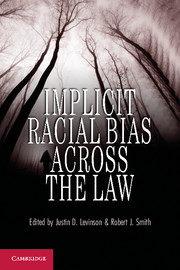Book contents
- Frontmatter
- Contents
- Contributors
- Acknowledgments
- Implicit Racial Bias Across the Law
- Introduction Racial Disparities, Social Science, and the Legal System
- 1 Implicit Racial Bias
- 2 Property Law
- 3 Criminal Law
- 4 Torts
- 5 Employment Law
- 6 Health Law
- 7 Education Law
- 8 Communications Law
- 9 Corporations Law
- 10 Tax Law
- 11 Intellectual Property
- 12 Environmental Law
- 13 Federal Indian Law
- 14 Capital Punishment
- 15 Reparations Law
- Index
- References
13 - Federal Indian Law
Implicit Bias against Native Peoples as Sovereigns
Published online by Cambridge University Press: 05 June 2012
- Frontmatter
- Contents
- Contributors
- Acknowledgments
- Implicit Racial Bias Across the Law
- Introduction Racial Disparities, Social Science, and the Legal System
- 1 Implicit Racial Bias
- 2 Property Law
- 3 Criminal Law
- 4 Torts
- 5 Employment Law
- 6 Health Law
- 7 Education Law
- 8 Communications Law
- 9 Corporations Law
- 10 Tax Law
- 11 Intellectual Property
- 12 Environmental Law
- 13 Federal Indian Law
- 14 Capital Punishment
- 15 Reparations Law
- Index
- References
Summary
In the midst of a contentious political debate about Native Hawaiian sovereignty, former Hawaiʿi governor Linda Lingle implored the U.S. Senate to reject the “Akaka Bill,” proposed legislation designed to restore a small measure of self-governance to the Native Hawaiian people. In short, the bill would facilitate the formal recognition of Native Hawaiians as a self-governing Native community, bringing their political and legal status roughly on par with that of other Native peoples in the United States. Lingle based her opposition, in part, on the unfounded assumption that a Native Hawaiian government with self-governing powers similar to those possessed by Native American and Native Alaskan governments would exercise those powers “in a way that is inconsistent with State criminal statutes otherwise applicable to all citizens, and inconsistent with virtually every conceivable state law that serves to protect the public.” She also maintained that restoring Native Hawaiian self-governance would require the state to develop a plan to “enforce its interests against unlawful or irresponsible actions by the [Native Hawaiian] governing entity or its elected leaders or employees.” Although the public will probably never know the extent to which Lingle's opposition stymied the bill's progress, her opposition is significant because it highlights a pernicious process that functions to dispossess Native peoples of land, resources, and governing authority.
This process began nearly two centuries ago when European Americans began using U.S. law and legal discourse to justify the appropriation of Native lands, resources, and governing authority. To legitimize the dispossession, European Americans stereotyped Native peoples as a foreign race of savages who lacked the requisite knowledge and industry to exercise full sovereignty. Reinforced by literature and media, the image of Native peoples as “nothing more than wandering hordes, held together only by ties of blood and habit, and having neither laws or government, beyond what is required in a savage state,” came to dominate. Within a few generations, this negative stereotype became an unquestioned assumption that formed the basis of contemporary implicit bias against Native peoples.
- Type
- Chapter
- Information
- Implicit Racial Bias across the Law , pp. 209 - 228Publisher: Cambridge University PressPrint publication year: 2012



